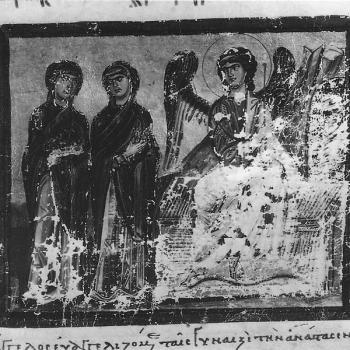When we discuss Biblical love, we don’t take into account that there are different types of love specified in Scripture. Every one of these different terms has different meanings. They also take into account different things, to give us different insights. The varied concepts of love show us that love is both complicated and multi-dimensional. It’s a reflection of both a people experience and a spiritual one. The more we learn about it, the better we recognize and embrace it for ourselves.

Complicated or not, love is worth learning about. It’s worth seeing it for what it is and how it changes and transforms lives. If we can understand more about it, we can better recognize and walk in it. Exploring the Bible’s concepts about love prove that love isn’t just a nice ideal or a philosophical musing, but a serious reality. No matter what we might believe about God ourselves, we can’t love without God, because God is love (1 John 4:8, NIV). Any time we explore or venture in love, we are cooperating with God’s bigger plan for us. We may not understand it, but it is there, nonetheless.
In this article, we will explore five headings for terms translated as “love” in Scripture:
- ‘Ahab/eros
- Storgay
- Hesed
- Raham/phileo
- Agape
‘Ahab/Eros
I mention ‘ahab (Hebrew) and eros (Greek) together because they are rough equivalents of one another in root understanding. The first example we see of love in the Old Testament is ‘ahab. It was a catch-all term to describe love overall (language was more primitive in Biblical times). Some of the concepts it covers include:
- Sexual attraction or love
- Love between people
- Friendship
- Human interests
- Appetite
- Desire
- Lovers
- God’s love toward humanity, Israel, or the right thing
- Something lovely or desirable
- Like
Eros is defined as:
- Desire
- Love
- Sexual passion
It is eluded to in the Septuagint (the Greek translation of the Old Testament) especially in the Song of Solomon.
While eros is more simplistic, there is a common theme in both eros and ‘ahab: that of attraction or desire. In ‘ahab and eros, one seeks something because something draws someone to it. As a result, this form of love is best described as attraction.
Its usage
Who do you think first “loved” someone else in the Bible? Adam loving Eve, perhaps? Eve loving Abel? Lot’s wife loving Sodom? Many are surprised the word “love” is first used in the context of a parent and child. Genesis 22:2 says:
[God] said, Take now your son, your only son Isaac, whom you love, and go to the region of Moriah; and offer him there as a burnt offering upon one of the mountains of which I will tell you. (AMPC)
Abraham loved Isaac because he made a choice between his two sons. He didn’t feel the same way about Ishmael as he did about Isaac. As a result, he made a choice between the two: he favored (or preferred) Isaac over Ishmael. Whether it was due to the circumstances surrounding their births or just because he had more in common with Isaac, Abraham distinguished between his sons. He was drawn (‘ahab) to one over the other.
From this point on, we see a differentiation made between people in Scripture. For example, Jacob loved Rachel, but not Leah. Jacob favored, or loved Joseph, above his other children. Israel was favored over Esau. People started defining how they felt about their relationships by what attracted them to another.
This same terminology was also used to describe God and His people. Just as human beings chose one another, so God chose His people for relationship and agreement.
This fundamental “drawing” brings people together. It gives us a purpose to come together in a deeper way than just doing things by ourselves. We long for connection; ‘ahab and eros describe the draw, or attraction, by which we come together.
What Biblical love says to us
‘Ahab and eros teach us about ourselves. They give us clues into what we like the most, what we seek out, what turns our head and charms us, what is most important, and ultimately, what we desire. In the most basic of ways, this form of love teaches us about what motivates our choices.
Because of how ‘ahab and eros work, they also teach us that there’s nothing inherently sinful about attraction. Love is, in and of itself, something that brings people together. We may not understand just why we are drawn to certain people and not others, but it is a process by which we are drawn one to another. While such can be used in a sinful manner (such as favoritism of children), love is designed to unite us.
It also shows us love makes an agreement; a unity. In agreement, sometimes sacrifice is a requirement. Love is, in and of itself, a commitment.
Storgay (philostorgos)
Storgay (Greek) is used to describe a mutual love among family members. Its use is especially common among parents and children and spouses. By extension, it can be used to refer to those we think of as family, friends, or close associates who are not be blood relatives. It is also used to describe the familial-like bond Christians share in the faith. Such is seen in Romans 12:10:
Love one another with brotherly affection [as members of one family], giving precedence and showing honor to one another. (AMPC)
Storgay is, therefore, best described as familial alliance.
Its usage
Storgay designates a mutual love determined by a mutual interest. In a Biblical context, that interest is the survival of a group or clan. In a bigger sense, we learn much about love from our early familial experience. There’s dispute over how these ideas are formed as well as how they change as we enter society and encounter others outside our families. This is not to say our ideas can’t change, but much of how we view the world and trust others has its origins in childhood and family interactions. No, we are not doomed if we didn’t have perfect childhoods. It’s just to state that many of our ideas come from somewhere.
Storgay explains why Genesis, our “book of beginnings,” is all about familial relationships. It provides insight into why people return to their families of origin, even when they face rejection. It explains why abused children want their abusive parents, even when it doesn’t make sense. Storgay explains why people still insist on a familial alliance even in the face of toxicity. We have an innate inclination to storgay. When it’s not present, it goes against our survival instincts.
What Biblical love says to us
Familial love is often complicated. The Bible itself shows it’s not always unconditional. Improperly tempered, it can become exclusionary. The world isn’t us vs. them; your family isn’t your only obligation or responsibility. Family is not the only place we develop and grow in love. It can, and often is, an important step in becoming a productive, sincere, and connected human being. It is not, however, the only source of such. Family exists as a foundational place, not a final idea. More than anything else, it is about obligation and responsibility; learning to cooperate in community; and learning to work with those who are sometimes too much like we are.
Scripture shows there isn’t just one type of family. Abram was close to his nephew, Lot (Genesis 11:31). Tamar was a single mother of twins (Genesis 38:27-30). Moses was raised by Pharaoh’s daughter (Exodus 2:1-10). Esther was raised by her cousin, Mordecai (Esther 2:7). Hosea raised children that were not his biological children (Hosea 1:2).
As we mature, we learn to love those who are different as much as those like us. Thus, we embrace the church as our family in Christ, just as if they were blood relatives. We abide with those in faith as we would anyone else, bonded in our faith. God shows us through the love of Christ we need our spiritual family to survive as much as our natural families.
Hesed
Hesed (Hebrew) is translated as goodness, kindness, or faithfulness. There is one specific term, however, that relates hesed to love: lovingkindness. Hesed is more than just doing something to do it; it connects back to why we do the things we do. It is not a catch-all term, but a specific one that refers to the specific depths and ideals that reflect the best in the divine nature. When we embrace hesed, we partake in the divine nature ourselves.
Yet the Lord will command His loving-kindness in the daytime, and in the night His song shall be with me, a prayer to the God of my life. (Psalm 42:8, AMPC)
The Lord appeared from of old to me [Israel], saying, Yes, I have loved you with an everlasting love; therefore with loving-kindness have I drawn you and continued My faithfulness to you. (Jeremiah 31:3, AMPC)
And I will betroth you to Me forever; yes, I will betroth you to Me in righteousness and justice, in steadfast love, and in mercy. (Hosea 2:19, AMPC)
Its usage
We often hear about love being something we “do” versus something we “feel.” Hesed is a form of “drawing” like we spoke of earlier, with a major difference: it’s not so much a specific choice as something that we both feel and do. As a noun, it describes a state of being that motivates or prompts a specific expression. Hesed is a feeling, but doesn’t stop at feeling. It motivates us to do something for someone else. If we move in hesed, we are drawn to do. By so doing, we draw others to God through our actions.
In hesed, we find goodness:
- Exemplifying certain aspects of God’s character as our own
- Being upright in our hearts and lives
- Be more than we were yesterday and walk in everything we know to be right today
kindness:
- Love in action
- Turn away from sin and toward the goodness of God
and faithfulness:
- The condition and action of our faith, making our faith visible for others to see.
What Biblical love says to us
Hesed forces us to examine our motives. We can do the greatest deeds in the world and do them without God’s love. If we want to make a difference as our actions matter, God’s love must be our motivation. Before we do for others, we must first accept God’s draw to Him.
Raham/Phileo
Both raham (Hebrew) and phileo (Greek) describe the nature and characteristics of friendship. Raham describes characteristics of friendship:
- Love
- Loving deeply
- Mercy
- Compassion
- Tender affection
while phileo describes:
- Love of brothers and sisters
- Brotherly love
- Love among the brethren
In a world that often extols other forms of love above the platonic, the Bible reminds us how important friendship is. The family we choose, we should love our friends for who they are, as they are, and believe the best for them as they do the same for us.
Its usage
Friendship extends our borders beyond our immediate families. The concept of friendship introduces us to “found family,” or love and alliance due to bond rather than obligation. We agree to be there for one another and care for each other, teaching us about different levels of love in our lives.
A friend loves at all times, and is born, as is a brother, for adversity. (Proverbs 17:17, AMPC)
The man of many friends [a friend of all the world] will prove himself a bad friend, but there is a friend who sticks closer than a brother. (Proverbs 18:24, AMPC)
Your own friend and your father’s friend, forsake them not; neither go to your brother’s house in the day of your calamity. Better is a neighbor who is near [in spirit] than a brother who is far off [in heart]. (Proverbs 27:10, AMPC)
What Biblical love says to us
The Bible doesn’t specifically differentiate types of friends. Instead, it embraces them all. We can have queerplatonic partnerships, good friends, best friends, and casual aquaintences. Some friends are for a season; some are long-term. In friendships, we learn to handle conflicts, take constructive criticism, and experience the blessing of sincere feedback.
The Bible also tells us to have good friends, we should be good friends. Friendship, in and of itself, is a discipline. Just as there can be good friends, there can also be fake or bad friends, so we should use good judgment in our actions and associations. We must be both: be good friends and have good friends.
‘Agape
‘Agape (Greek) is a higher form of love than attraction, interest, or friendship. It aspires for the highest good, the greatest interest or goal possible. In the form of love (whether it is loving God, God loving us, or us loving another), it is the greatest love anyone can offer:
- Gives unselfishly with good motive
- No negative intention
- Beyond what we can rightly imagine or fathom with our natural thinking
Its usage
There are a few key passages in Scripture that speak of ‘agape love. The most popular one is 1 Corinthians 13:4-8. Often used at weddings, it isn’t speaking of marital love specifically (although spouses can definitely benefit from ‘agape love). This most famous passage of Scripture explains the characteristics of ‘agape love through what it is and what it is not:
Love endures long and is patient and kind; love never is envious nor boils over with jealousy, is not boastful or vainglorious, does not display itself haughtily. It is not conceited (arrogant and inflated with pride); it is not rude (unmannerly) and does not act unbecomingly. Love (God’s love in us) does not insist on its own rights or its own way, for it is not self-seeking; it is not touchy or fretful or resentful; it takes no account of the evil done to it [it pays no attention to a suffered wrong]. It does not rejoice at injustice and unrighteousness, but rejoices when right and truth prevail. Love bears up under anything and everything that comes, is ever ready to believe the best of every person, its hopes are fadeless under all circumstances, and it endures everything [without weakening]. Love never fails [never fades out or becomes obsolete or comes to an end]… (AMPC)
What Biblical love says to us
We are able to see evidence of ‘agape love in the sacrifice of Christ. Such reveals how much God loved us: enough that, through Christ, God would sacrifice Himself for our redemption:
For God so greatly loved and dearly prized the world that He [even] gave up His only begotten (unique) Son, so that whoever believes in (trusts in, clings to, relies on) Him shall not perish (come to destruction, be lost) but have eternal (everlasting) life. For God did not send the Son into the world in order to judge (to reject, to condemn, to pass sentence on) the world, but that the world might find salvation and be made safe and sound through Him. (John 3:16-17, AMPC)
Biblical love isn’t just a nice idea or musing. In Christ’s sacrifice, we don’t find a relationship by which we offered to God and God kept taking, with no end in sight. Through Christ, God met us where we were. He did for us what we couldn’t do for ourselves. Without God’s love, we can do nothing.
We express our union with God – this eternal bond – by loving other people. In our walk, we embody characteristics that make us dedicated, safe, and spiritual. From there, we love our neighbor as ourselves. It is our posture to seek for others the good we seek for ourselves.
Biblical love as a challenge
Each form of Biblical love offers us something unique and different. ‘Ahab and eros speak of preferences, likes, dislikes, and desires. Storgay speaks to us about our ideas of family. Hesed reveals motives. Raham and phileo remind us how important friendships are. ‘Agape teaches us about the love of God and why loving others is central to our faith. On those days when love seems challenging, we must, nonetheless, remember its importance. Every one of us is here because someone loved us: God and others who prayed, spoke, encouraged, and modeled faith for us. We exist because of love. Now, let’s love someone else like someone loved us.
For more on this topic, check out the Kingdom Now podcast (Season 5, Episode 6: Love, Bible Style) and my book, Created for Love: An Evolution of Love in the Bible (and What it Means for Us).














